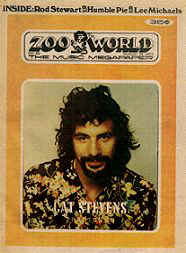- Zoo World
- August 30, 1973
- Cat Stevens
- A&M SP-4391
Record Review - FOREIGNER
 Fade in to the scene of a newly discovered folkie.
With a batch of reasonably coherent melodies he cuts his first contribution on shimmering
wax. Simply arranged, the package contains a quiet acoustic guitar, a whispering fuzz
bass, and a timid rhythm section. The album never gets higher than number 192 on the trade
charts but this latest singer-songwriter is hailed as the new sage of modern consciousness
as his fame and fortune begin to spread. Fade out. Fade in to the scene of a newly discovered folkie.
With a batch of reasonably coherent melodies he cuts his first contribution on shimmering
wax. Simply arranged, the package contains a quiet acoustic guitar, a whispering fuzz
bass, and a timid rhythm section. The album never gets higher than number 192 on the trade
charts but this latest singer-songwriter is hailed as the new sage of modern consciousness
as his fame and fortune begin to spread. Fade out.
Fade in three years, three
producers, four a&r men, one hundred groupies and five albums later. It’s time
for a new record. The bass is cut in Muscle Shoals, the brass in London, the strings in
New York, and the chorus in Jamaica. Modern jet fleets scurry the tapes around terra
inferma till a musical Dr. Strangelove with a master console mixer (the size of which
would dwarf Mister Spock’s computer equipment) combines the tapes together. What
comes out is a sharp, polished album with our living legend singing over-metaphorised
lyrics hidden between the Jamaica reggae and the London brass. Fade out.
The scenario mentioned
above happens too often with a variety of stars. It must be said however, that in the
Cat’s case he could sing Bill Monroe and the Bluegrass Boys’ compositions backed
by an Indian raga trio and still come through with sincerity and vitality. Foreigner is
even more significant than the phenomenon of the artist and his words cutting doggedly yet
triumphantly through the maze. The latest offering by the most communicative
singer-songwriter of the moment marks the emergence of Cat Stevens, musician-producer and
studio honcho.
With the release of Foreigner,
the considerable talents of Cat are expanded multifold. Immediate auditing produces a
deceiving first impression of obtuse phrasings forced side to side with hackneyed ones.
This album (if for no other reason than the complexity of Cat’s work) produces a
first impression of an over-arranged, brassy, unclear collection of gobbledygook. This
fallacious assumption is most abruptly apparent on the nineteen minute "Foreigner
Suite," the eight movement monument enveloping all of side one. Yet first impressions
are often faulty ones.
A jigsaw puzzle when first
purchased radiates an array of confusion. Where do the pieces fit and what does the puzzle
mean? It is easy to give up on something that complex. Yet in lyrical virtuosity Stevens
can be interpreted on two levels—refined and simple. An English teacher might say
that Cat’s poetry employs simple phrasing—"Come on over, it’s freedom
calling," "Heaven must have programmed you," or "Oh, sweet blue love,
no man can ever get enough." Yet the virtuosity of Cat’s lyrics is that he can
dress simple phrasings in a cloak of combined musical ornateness coupled with perceptive
lyrical bridgework, uniting variations on the same subject into a unified message.
That’s the strong verbal point of "Foreigner Suite."
Not a piece to immediately
reveal its intimate secrets, the "Suite," written in eight movements, appears to
be a plea to a girl he already knows. He pleads with her to free herself and really love
him as he knows she is capable of doing. He authors several musical and verbal approaches
to the hairy task at hand. Overall the mood evoked is one of cautious optimism.
This is Cat Stevens’
first effort at producing an album. Any previous comments as to the musical paucity
existing in any of his works must not be applied to this album. As implied before there is
a tendency toward over arrangement evident at certain points throughout the album,
particularly on the almost anti-climatic second side.
Let’s not spoil the
fun just yet. The "Suite" is truly a gem that must be listened to time after
time. As aided by the efforts of several creative session musicians (notably guitarist
Phil Upchurch, drummer Bernard Purdie and string-brass arranger Jean Roussel) the jigsaw
puzzle fits into a unity of musical message. Yet one of the prime discoveries apparent on
this album is that Cat Stevens is a musician of clever creativity. Once-content with
playing basic figures, while leaving complex colorations to sidemen such as guitarist Alun
Davies, Cat has shed these trappings of support and come up with his own approach.
It must be remembered that
on Catch Bull at Four, he was musically involved. Yet there is a greater flow of
ideas here. For example it’s the Cat’s idea to incorporate bouncy ARP on the
"Sunnyside Road" section of "Suite." Ditto the bright upper-register
keyboard twinkling (reminiscent of Tillerman’s "Sad Lisa") on the
"Love Must Have Made You On A Sunday" movement. Yet the shining gem is a
preciously elegant hummable riff on the last movement when Cat’s guitar and piano
merge with Jean Rousell’s electric piano and Cat sings a mildly hokey but pleadingly
evocative urge to the girl to really love him. Oh, that darn riffs in that precious piece.
So far today I’ve hummed it while shaving and eating, and while driving to the 7-11
for some tin foil. I’m even humming it now.
The second side brings
forth more of the musical maturity of Steve Georgiou (Cat) to the forefront. I swear I
hear Norman Whitfield arranging the Temptations in the suspenseful
entendre-and-a-half suggestive "Later." The song features alternative stanzas of
elegance and funk as no-nonsense Cat outlines his thinly veiled goals to his female
companion. The lyrical virtuosity again shines, especially in the implied premise that
"love is the ultimate truth," as messaged in "The Hurt." Quite
pedestrian musically, the song belies and downgrades short-cuts to truth such as Gurus and
books and stresses the hurt of love as THE vital life-learning experience. Norman Whitfield arranging the Temptations in the suspenseful
entendre-and-a-half suggestive "Later." The song features alternative stanzas of
elegance and funk as no-nonsense Cat outlines his thinly veiled goals to his female
companion. The lyrical virtuosity again shines, especially in the implied premise that
"love is the ultimate truth," as messaged in "The Hurt." Quite
pedestrian musically, the song belies and downgrades short-cuts to truth such as Gurus and
books and stresses the hurt of love as THE vital life-learning experience.
(If Roberta Flack is
reading this article, I suggest to you that on your next album you consider recording
"How Many Times." It is a piano-dominated statement of the dreariness of life
without love. Yet the musical strains of the song are so much like you Roberta—you
could kill us softly. Cat does too.)
That is essence is Cat
Stevens. He can kill people softly with his song. Permit a few errors such as inclusion of
the over-preachy "100 1 Dream," a humdrum song. Allow the wastefulness of
putting three femme jazz singers on the album and sticking gospel-influenced hums in
musically divorced places. Sanction the over-utilized brass. The concluding feeling is one
of awe at the strong but passionately elegant voice of Cat, emerging from all the
overdubbing and consoles to make a lyrical and musical statement of prime
importance.— RUSSELL SHAW
Up To Top |